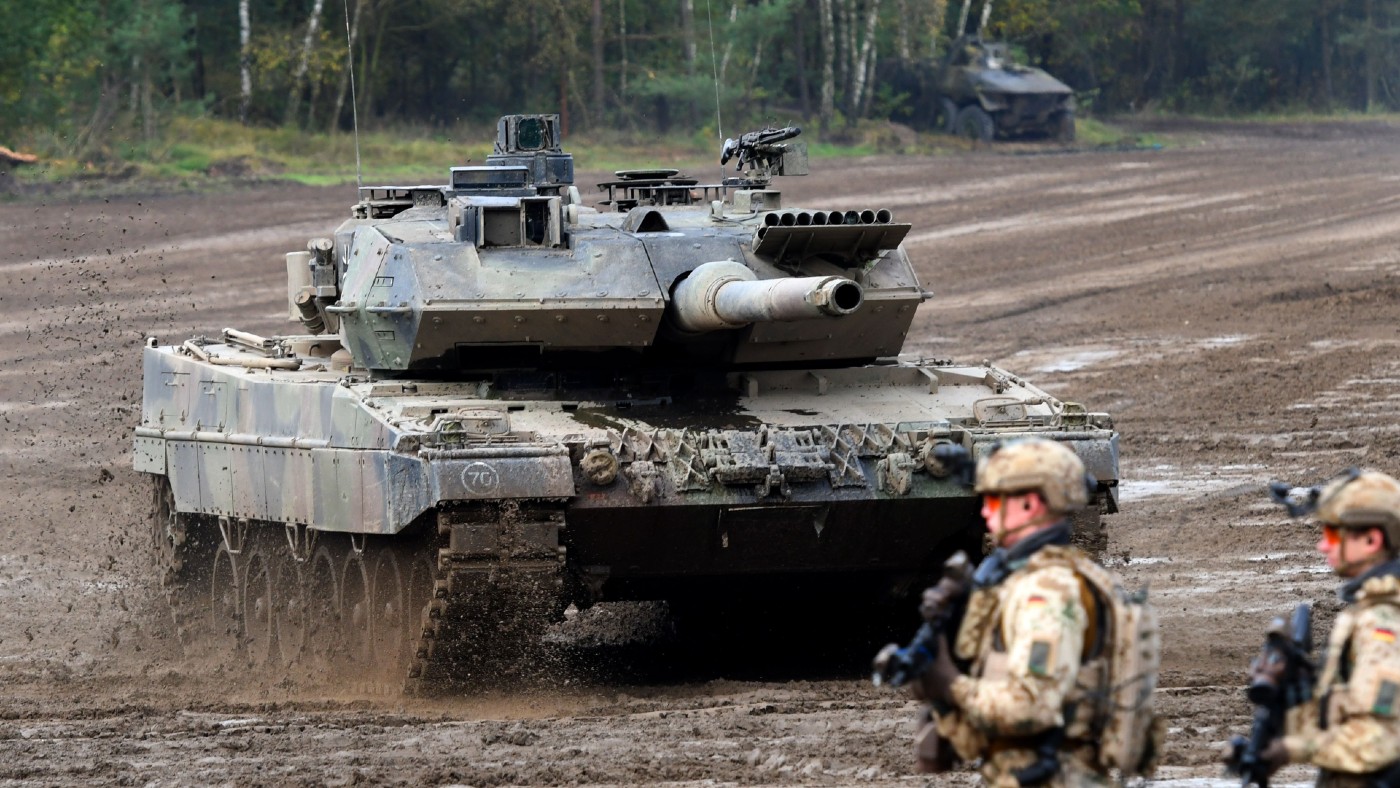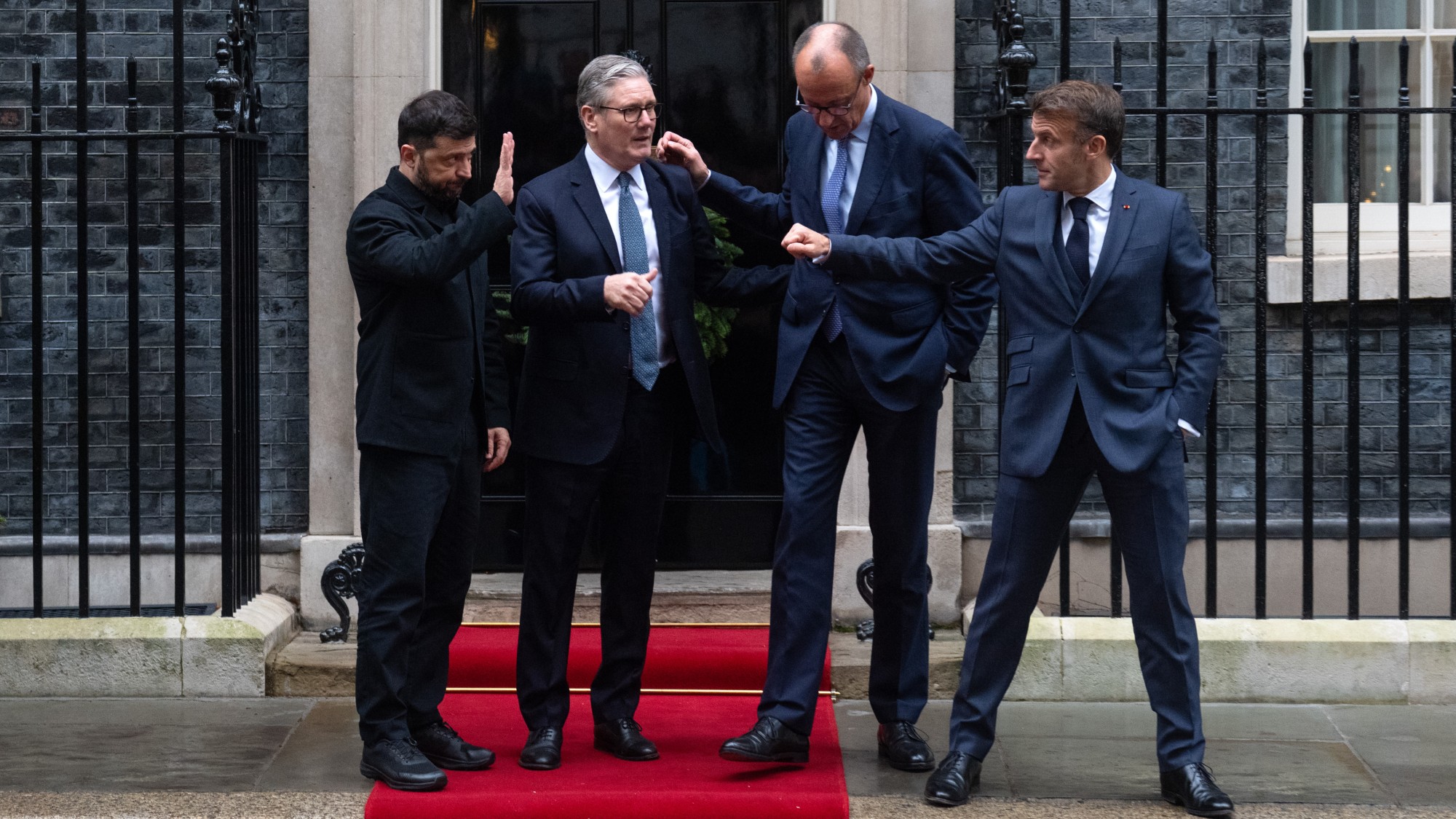The strategy behind Germany’s tank timidity
Kyiv has appealed to Western allies for heavy weaponry to fight off an anticipated Russian offensive

A free daily email with the biggest news stories of the day – and the best features from TheWeek.com
You are now subscribed
Your newsletter sign-up was successful
German-made tanks could be key to turning the tide of the war in Ukraine, and Germany is under growing pressure to provide them amid fears of a new Russian offensive.
Germany, which has enjoyed decades of close economic ties with Russia, has so far been hesitant to provide Ukraine with its Leopard 2 tanks, and to approve the donation of German-made tanks from other allied nations.
‘Window of opportunity’
Western officials believe there is an impending “window of opportunity” in which Ukraine may be able to push Russian forces back, said the BBC, and that Moscow is “running short of ammunition and trained troops” despite efforts to mobilise additional forces.
The Week
Escape your echo chamber. Get the facts behind the news, plus analysis from multiple perspectives.

Sign up for The Week's Free Newsletters
From our morning news briefing to a weekly Good News Newsletter, get the best of The Week delivered directly to your inbox.
From our morning news briefing to a weekly Good News Newsletter, get the best of The Week delivered directly to your inbox.
Many believe that Germany’s Leopard tanks could be “key” to forcing back Russian forces. They are in “more plentiful supply” than British tanks and are operated by “more than a dozen other nations”, added the broadcaster.
Allies such as Poland and Finland are keen to provide Ukraine with their own German-made Leopard tanks – but Germany must give them permission to export the tanks, which it has yet to do.
Defence officials from more than 50 countries gathered at the Ramstein air base in southern Germany today, a day after several allied nations pledged more equipment to Ukraine to fend off further Russian offensives. Ukrainian president Volodymr Zelenskyy made a direct appeal for tanks at the talks, telling ministers at the airbase that “hundreds of thank yous are not hundreds of tanks”.
‘Long-standing German reticence’
“Germany’s long-standing reticence to wade into foreign conflicts” is in part due to “norms and policies built on guilt over World War II”, said The Washington Post. It is “anxious to avoid being seen as militarily aggressive in the decades since” the Second World War and has therefore “largely shied away from exporting weapons into conflict zones”.
A free daily email with the biggest news stories of the day – and the best features from TheWeek.com
For these reasons, it is sometimes described as a “pacifist” nation in security and foreign policy circles, added the paper.
Others, however, argue that Germany’s approach to international conflict is less to do with a “principled aversion to war” and is instead dependent on a “deep-seated preference for diplomacy and the idea of pushing change through economic ties”.
Germany’s historic ties with Russia have meant that the war in Ukraine has put the country in a difficult position, it added. Former German chancellor Angela Merkel, who hails from East Berlin and is fluent in Russian, played a key role in brokering a ceasefire agreement with Russia in the contested region of Donbas in 2014. But her tenure also “deepened Germany’s dependence” on Russian fossil fuels.
But it is not simply Germany’s “conscience” that is driving its foreign policy, writes Politico’s European correspondent Matthew Karnitschnig – it is its corporations. He adds that while Germany may “hang back” from supporting Ukraine in its fight to “defend its democracy from invasion by a tyrant”, it seems to have “no qualms” over selling weapons to authoritarian regimes in the Middle East such as Egypt and Qatar.
“Berlin is still holding out hope that Ukraine can somehow patch things up with Russia so that Germany can resume business as usual and switch the gas back on,” Karnitschnig argues. And even if Germany does eventually agree to send tanks to Ukraine, it is likely to “deliver as few as it can get away with and only after exhausting every possible option to delay”.
‘Tanks for tanks’ deal with US
Despite increasing international and domestic pressure, reports suggest that Chancellor Olaf Scholz will only agree to send tanks to Ukraine if the US also agrees to supply its M1 Abrams tanks – “something the Pentagon has said for months it has no intention of doing given the logistical costs of maintaining them”, said CNN.
The UK, Poland, Finland and the Baltic states have all pushed for Nato members to provide heavier equipment to Kyiv “amid what they believe is a key inflection point in the war”, said the broadcaster.
But to date only the UK has agreed to provide heavy weaponry in the form of tanks. It is set to send 14 of its Challenger 2 tanks, although other countries including Germany, France and the US have sent or pledged other armoured vehicles and air defence systems.
Sorcha Bradley is a writer at The Week and a regular on “The Week Unwrapped” podcast. She worked at The Week magazine for a year and a half before taking up her current role with the digital team, where she mostly covers UK current affairs and politics. Before joining The Week, Sorcha worked at slow-news start-up Tortoise Media. She has also written for Sky News, The Sunday Times, the London Evening Standard and Grazia magazine, among other publications. She has a master’s in newspaper journalism from City, University of London, where she specialised in political journalism.
-
 The ‘ravenous’ demand for Cornish minerals
The ‘ravenous’ demand for Cornish mineralsUnder the Radar Growing need for critical minerals to power tech has intensified ‘appetite’ for lithium, which could be a ‘huge boon’ for local economy
-
 Why are election experts taking Trump’s midterm threats seriously?
Why are election experts taking Trump’s midterm threats seriously?IN THE SPOTLIGHT As the president muses about polling place deployments and a centralized electoral system aimed at one-party control, lawmakers are taking this administration at its word
-
 ‘Restaurateurs have become millionaires’
‘Restaurateurs have become millionaires’Instant Opinion Opinion, comment and editorials of the day
-
 Witkoff and Kushner tackle Ukraine, Iran in Geneva
Witkoff and Kushner tackle Ukraine, Iran in GenevaSpeed Read Steve Witkoff and Jared Kushner held negotiations aimed at securing a nuclear deal with Iran and an end to Russia’s war in Ukraine
-
 How corrupt is the UK?
How corrupt is the UK?The Explainer Decline in standards ‘risks becoming a defining feature of our political culture’ as Britain falls to lowest ever score on global index
-
 ‘The mark’s significance is psychological, if that’
‘The mark’s significance is psychological, if that’Instant Opinion Opinion, comment and editorials of the day
-
 The high street: Britain’s next political battleground?
The high street: Britain’s next political battleground?In the Spotlight Mass closure of shops and influx of organised crime are fuelling voter anger, and offer an opening for Reform UK
-
 Vance’s ‘next move will reveal whether the conservative movement can move past Trump’
Vance’s ‘next move will reveal whether the conservative movement can move past Trump’Instant Opinion Opinion, comment and editorials of the day
-
 What have Trump’s Mar-a-Lago summits achieved?
What have Trump’s Mar-a-Lago summits achieved?Today’s big question Zelenskyy and Netanyahu meet the president in his Palm Beach ‘Winter White House’
-
 Who is paying for Europe’s €90bn Ukraine loan?
Who is paying for Europe’s €90bn Ukraine loan?Today’s Big Question Kyiv secures crucial funding but the EU ‘blinked’ at the chance to strike a bold blow against Russia
-
 Will there be peace before Christmas in Ukraine?
Will there be peace before Christmas in Ukraine?Today's Big Question Discussions over the weekend could see a unified set of proposals from EU, UK and US to present to Moscow